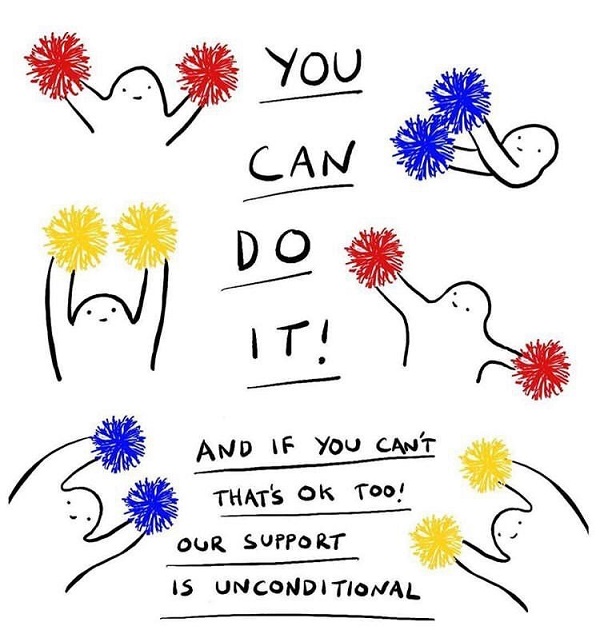Remote learning, a manner of pursuing education that seemed unimaginable to the traditional student, has become a prevalent new reality. Students, whether they were spending their semesters abroad or at their home institutions, have had to adjust to the rapidly changing environment of pedagogy, and for most of us, this process hasn’t unfolded without its challenges. As I’ve navigated these new circumstances after returning home from Granada, Spain, I’ve found certain practices to be quite helpful when it comes to learning outside of the traditional classroom. Here are my top tips for remote learning and overcoming its obstacles:
1. Designate a space in your home that is dedicated to remote learning
The first action step I took to accommodate the new online format for my classes was picking a spot in my home to designate for academics. For me, this involved clearing off my desk and prepping it with plenty of pens and pencils, index cards, and White-Out, as well as outfitting my space with objects that make me happy, such as potted plants I’ve had for years, photographs of my friends and family, and a wooden giraffe I purchased while in Granada. Organizing a space to complete my academic work has held me accountable and ensured that I separate work from comfortable spaces. Because I’m completing my work at a desk rather than on my bed or in a comfy chair, my desk has become my space for learning, and I’ve been much more productive during this time of transition and adjustment. This process of separating the spaces in my home has helped me maintain a routine, have a dedicated mindset for my different tasks and hobbies, and remember to participate in certain activities at specific times and in specific places, just like when I was taking classes in person at the Center for Modern Languages.
2. Get as close to being in class as possible
It’s not enough to simply set your laptop on your desk and get to work. On top of dedicating a space for remote learning, whether that’s a desk, your kitchen table, or a home office, it’s equally as important to get as close to being in class as possible. As I’ve mentioned in my blog about staying connected while learning and working in a virtual setting, I’ve realized how important it is to replicate my classes as I took them in Granada. For me, this means blocking out my class times on my Google Calendar and not getting ahead on work. On Mondays and Wednesdays, I attend three of my five classes, as well as participate in Skype calls that work with both mine and my professors’ schedules. On Tuesdays and Thursdays, I attend my remaining two classes, just like I did while I was in Granada. Not only does mimicking classes as I took them in Granada keep me on a normal schedule and routine, it helps me to not feel overwhelmed by the amount of work that’s readily available to me due to everything being on an online platform. I could easily try and complete all of my work for a given week starting bright and early on Monday morning, but avoiding this has helped me feel more relaxed and less pressured to get ahead. I “go to class” as if I were still in Granada having to stroll down Gran Vía de Colón at 8:00 in the morning, bringing normalcy to this difficult time and allowing for me to be successful in a virtual setting.
3. Use a planner and/or Google Calendar to stay on top of assignments
I would be completely lost without my planner and Google Calendar. As someone who thrives when I’m organized, I knew I needed ways to hold myself accountable and a way to promote ongoing success in remote learning, and that’s where my planner and Google Calendar came into the equation.
The online platform where my classes are located isn’t ideal for me to organize my assignments in one place. I use my Google Calendar to schedule events, such as my remote classes over Google Hangouts and Skype, student engagement opportunities, such as “intercambios,” and meetings with professors and classmates. I especially like how I can schedule reminders about upcoming events with Google Calendar so that I never miss an impending meeting. My planner is where I track the assignments I need to complete day by day to ensure I submit everything I need to by the end of the week. Using these two mediums to keep track of where I need to be and when I need to get tasks completed has helped me succeed in a virtual learning environment. Even utilizing just one of these methods to keep yourself organized can help provide you peace of mind, which I’ve found is so important during these unique times!
4. Take breaks and make time to regroup
It’s so easy to get caught up in work and bogged down with assignments, especially when you’re bound by four walls and the same environment day after day. I’ve found that taking “brain breaks” throughout my days has helped me remain mentally attentive and ready to tackle my online learning. Some ways I’ve been easing my body and mind have been through walks around my neighborhood (while socially distancing, of course), doing at-home workouts (which can be taken to the next level if you have friends you video chat with often and who like to work out, too!), listening to podcasts, finding new music to add to my playlists, preparing healthy meals and snacks for brain fuel, and so much more. Being at home has also sparked my creativity in terms of finding new ways to occupy myself and take breaks, as I quickly got bored of the same two to three activities. Our brains and bodies can only take so much work and stimulation, so be sure to reward your hard work of writing essays or completing projects with a nutritious snack and your favorite way to release some energy and recuperate. Your body will thank you later, and so will your upcoming assignments.
5. Reward yourself for the work you’ve done and remember to look forward to what lies ahead
Be proud of yourself. You’re currently navigating something so unexpected, so difficult to comprehend, and so challenging to adjust to. The work you’ve been putting in isn’t going unnoticed, which is something I’ve had to remind myself of. In order to reward myself at the end of a long day of classwork, I let myself watch my favorite Netflix show or YouTuber. I pick up my favorite book and read for however long I please. I perform acts of self-care that help me remember how important taking care of myself is if I want to continue being ambitious and present in a remote learning setting.
On top of caring for myself, I try to have a positive mindset for what lies ahead in the future. Remembering that there are positive outcomes at the end of this tough situation has helped me remain upbeat and hopeful, enabling me to prosper in much more than remote learning. One thing that I’m looking forward to is not having to end my abroad experience like I thought I had to a month ago. In order to keep my abroad experience alive, I’m pursuing a virtual internship this summer through CEA in Seville, Spain! Although this isn't going to be the same as being in Seville in person, CEA has adapted remarkably to the reality we’re facing, and I can’t wait to explore the great opportunity of undertaking a virtual internship through the organization that empowered me to have an incredible study abroad program experience in Granada, even if it was shortened. This is just one example of something you can look forward to. I’m also looking forward to moving back to Vermont and having access to all of the Ben and Jerry’s ice cream flavors I desire. Big or small, having a light at the end of the tunnel is an assured way to keep persevering during the reality we’re facing.
Remote learning is challenging. Remote learning is unparalleled. Remote learning has been something that a majority of students have had to adjust to within the last five weeks, which is a very short time frame to develop confidence and comfort with what’s new. While we are all approaching this new style of learning differently, I hope there might be something from this post that you can carry with you as you finish out the academic year!
Learn more about studying abroad.








